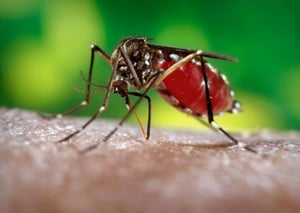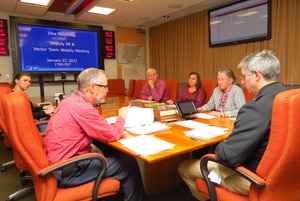Ready, Set, Go: CDC’s Incident Manager Training Program Prepares the Next Generation of Response Leaders
Training CDC Staff to Lead in an Emergency Response

A key response intervention was protection from the Aedes aegypti, the mosquito that transmits the Zika virus.
One way CDC ensures skilled staff are regularly available to lead an emergency response is through the Incident Manager Training and Development Program (IMTDP). CDC developed this program after an analysis of 14 CDC emergency responses showed there were only a limited number of staff with formal training in emergency response leadership. Seasoned response leaders facilitate each of the 10 modules in the IMTDP curriculum, covering topics such as the incident management structure, crisis leadership, crisis communication, and decision-making in a response. CDC leaders across the agency nominate experienced staff with expertise in a specific public health area—such as infectious diseases or environmental disasters—to participate in IMTDP.
IMTDP Graduates Lead 2016-2017 Zika Virus Response
The Zika Virus outbreak threatened the health of pregnant women and children across the country. Having trained, skilled staff at CDC leading the response was critical in reducing the threat posed by the virus.

CDR Petersen and Task Force Leads strategize Zika interventions at CDC’s
Emergency Operations Center.
During the Zika Virus Response, IMTDP recommended Commander Brett Petersen, MD, MPH for the Deputy Incident Manager (IM) role. The Deputy IM supports the IM—who reports directly to the CDC Director—in decision-making and coordination of response activities. Dr. Petersen is a Medical Officer in CDC’s Center for Emerging and Zoonotic Infectious Diseases, and was part of the very first cohort of CDC staff trained through IMTDP.
IMTDP Training Key to Successful Leadership on Zika
Dr. Petersen served as the Deputy IM for the Zika Response for a total of 90 days from October 2016 to January 2017. Thanks in large part to his IMTDP training, Dr. Petersen was successful in setting response priorities, coordinating laboratory teams with the Pan American Health Organization, and talking to the media about how the public can reduce their risk of Zika infection. Dr. Petersen describes how IMTDP’s training helped him be successful in his Deputy IM role, “Thanks to all the exercises we did in IMTDP training, I already knew how all the pieces of the response structure fit together when I started as a response leader for Zika. Seeing this bigger picture made it possible for me to help lead a successful response to a complicated public health emergency.”